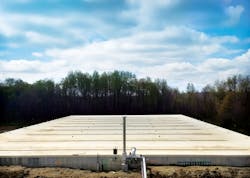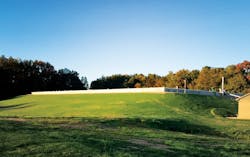About the author: Shannon Grant is president of ADI Systems. Grant can be reached at [email protected].
Rothenbühler Cheesemakers invested in a biological digester for eco-friendly wastewater management.
As global demand for dairy products increases, so does the resulting wastewater. The industry requires large amounts of water and power to keep producing high-quality products, and it simply cannot afford to waste these precious resources.
Smart dairy processors know that wastewater does not need to be wasted. By investing in the right wastewater treatment technology, dairy processors can milk more out of the water used during everyday operations, transforming wastewater into a valuable resource in its own right.
Ahead of the Curve
Rothenbühler Cheesemakers is a forward-thinking dairy processor. Since 1956, the company has been producing cheese using all natural ingredients and 100% Grade A milk. Formerly known as Middlefield Cheese, the family-owned company is one of the largest Swiss cheese manufacturers in the U.S.
Rothenbühler Cheesemakers’ plant in Middlefield, Ohio, produces six Swiss cheese varieties: Middlefield Cheese, Aarafalls, Ursario, Lacey Swiss, Jungfrau and Reserve Swiss. Middlefield cheese has won numerous awards, including second place in the U.S. Championship and the World Championship. The awards do not stop there; Rothenbühler Cheesemakers’ Aarafalls cheese won “Best in Category” in The World Championship and recently won second place in the 2016 World Championship. Rothenbühler Cheesemakers also produces many other fine hard and semi-hard cheeses, which in turn allows them to offer high-quality whey ingredient products.
Rothenbühler Cheesemakers’ motto in cheese—and in life—is: “Only the Best. All the time.” This is why the company prides itself on being good stewards of the Earth, blending the cheese making artistry of the past with modern-day innovation. The company’s U.S. Department of Agriculture-approved, Safe Quality Foods (SQF) Level III certified facility was already using eco-friendly initiatives to recycle on-site resources and responsibly treat its own wastewater. But the cheese processor raised the bar again when it went above and beyond basic environmental requirements and invested in a biological digester.
Onsite Solution
Rothenbühler Cheesemakers wanted an on-site solution to anaerobically pre-treat its raw wastewater, thereby remaining environmentally-responsible and reducing its carbon footprint. The biological digester was the answer. This type of wastewater treatment technology allows dairy processors to comply with increasingly strict environmental regulations, which keep the Earth’s fresh water sources clean and protected for future generations—all while reducing CO2 emissions.
ADI Systems was selected to design, install and commission the anaerobic wastewater treatment system for Rothenbühler Cheesemakers’ plant in Middlefield. The system consists of a 230,000-gal equalization (EQ) tank that pumps wastewater into an in-ground, 6.8-million-gal ADI-BVF digester. Anaerobic effluent is discharged by gravity to the existing downstream membrane bioreactor (MBR) system for aerobic polishing. The project also included construction of a control/electrical equipment building.
The biological digester uses a 230,000 gal EQ tank to pump wastewater to a 6.8-million-gal digester.
“We are thrilled to be able to process our wastewater responsibly. The ADI-BVF digester supports our vision of a well-ordered, efficient and technically advanced system,” said Gary Schoenwald, chief automation officer for Rothenbühler Cheesemakers.
The large volume within the digester provides a robust and diverse anaerobic microorganism community, making the system resilient to variations in influent characteristics, such as organic load, influent solids concentrations, pH, temperature and alkalinity. As wastewater passes upward through the sludge blanket, microorganisms digest the majority of the organic load, reducing chemical oxygen demand (COD), total suspended solids (TSS), and fats, oils and grease (FOG).
The low-rate system is designed to treat 600,000 gal per day of wastewater and remove approximately 90% of the influent COD. The wastewater treatment system also has simplified and improved process efficiency. The digester can directly digest raw wastewater (no dissolved air flotation or other FOG or TSS removal is required) and requires very little electrical horsepower, helping lower operational costs. Aeration energy and chemical requirements for the existing aerobic system also have been reduced.
Anaerobic digestion of wastewater has several advantages, including energy recovery from biogas. The process naturally produces biogas, which is collected beneath the digester’s gastight cover, minimizing greenhouse gas emissions. The biogas can be treated and utilized as a source of heat or electricity. At design conditions, approximately 320,000 cu ft of biogas is captured per day at Rothenbühler Cheesemakers’ production plant, which will be utilized in a new dual-fuel boiler, further minimizing costs for the cheesemaker. The digester’s long solids retention time and hydraulic retention time ensure complete biodegradation of the raw organic compounds, thus higher biogas production can be achieved.
“This project was a success due to the attention to detail that we experienced from ADI Systems’ staff—everything from the concept drawings through to installation and startup,” Schoenwald said. “The wastewater treatment system reduces our electrical consumption, provides biogas to supplement our existing plant heating, reduces biosolids production, and ultimately reduces our carbon footprint. We have seen significant savings in our electrical consumption and expect exceptional savings, as well from the use of the biogas.”
Today, consumers are concerned with complete supply chain transparency and sustainability. How dairy products are made is just as important as taste and cost. This encompasses every step in the production process, from cattle treatment to wastewater treatment. Rothenbühler Cheesemakers, with the help of modern day wastewater treatment technology, has set an example for the dairy industry and proved to the public that delicious dairy products can be made sustainably and responsibly.

